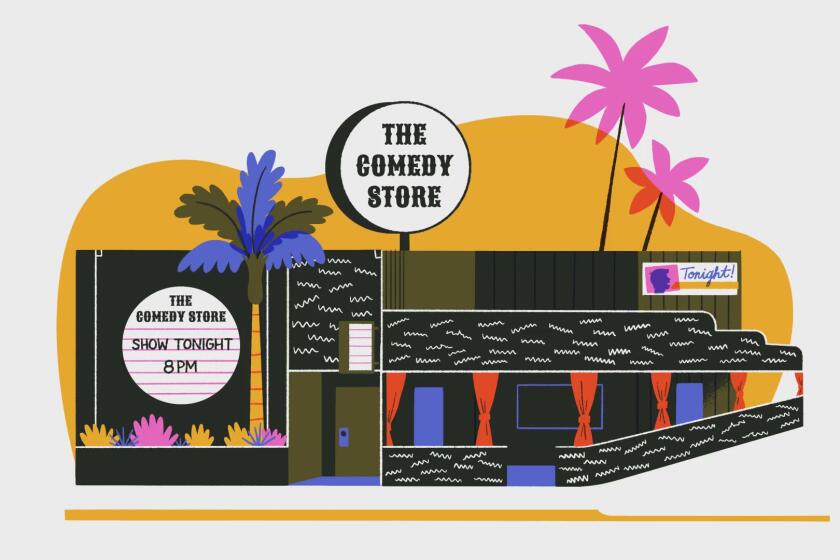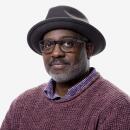‘A theater that is ours’: The Ledge opens a stage for L.A. improv actors of color
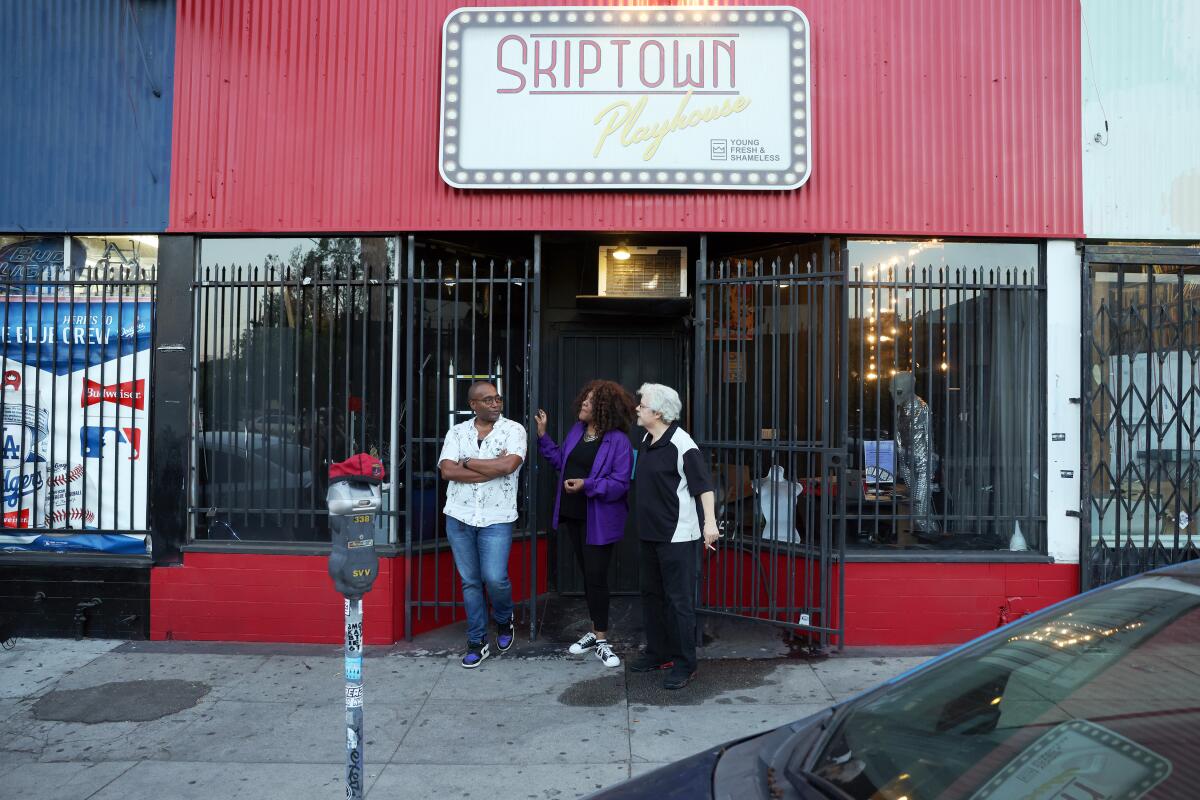
- Share via
In 2020, when ACME Comedy closed due to pandemic woes, Shaun Landry wondered aloud — via Facebook — if anyone would want to give her money to create a theater home for people of color. It was, mostly, an innocent query, but her network of friends, co-workers, students and more took it seriously, urging the improvisational actress-writer-teacher-mentor to keep pushing for that dream.
“The #MeToo movement hit, and then [Black Lives Matter] and us coming to grips with what was going on in improvisational theater, and also in comedy in general, and how we have been treated in certain establishments. That was going on — and then the pandemic hit,” Landry said.
These cultural upheavals seemed to stymie some in improvisational theater in Los Angeles (Landry is a member of many improv groups) as people scrambled to figure out what to do to keep the art form alive. The response to Landry’s online query and the stagnant nature of what was going on around her inspired her to act.
“I sat in numerous meetings online and on Zoom. There were a lot of people talking and a lot of stories. Hearing the stories is a good thing and it’s cathartic,” Landry said. “Stories are great, action is better.”
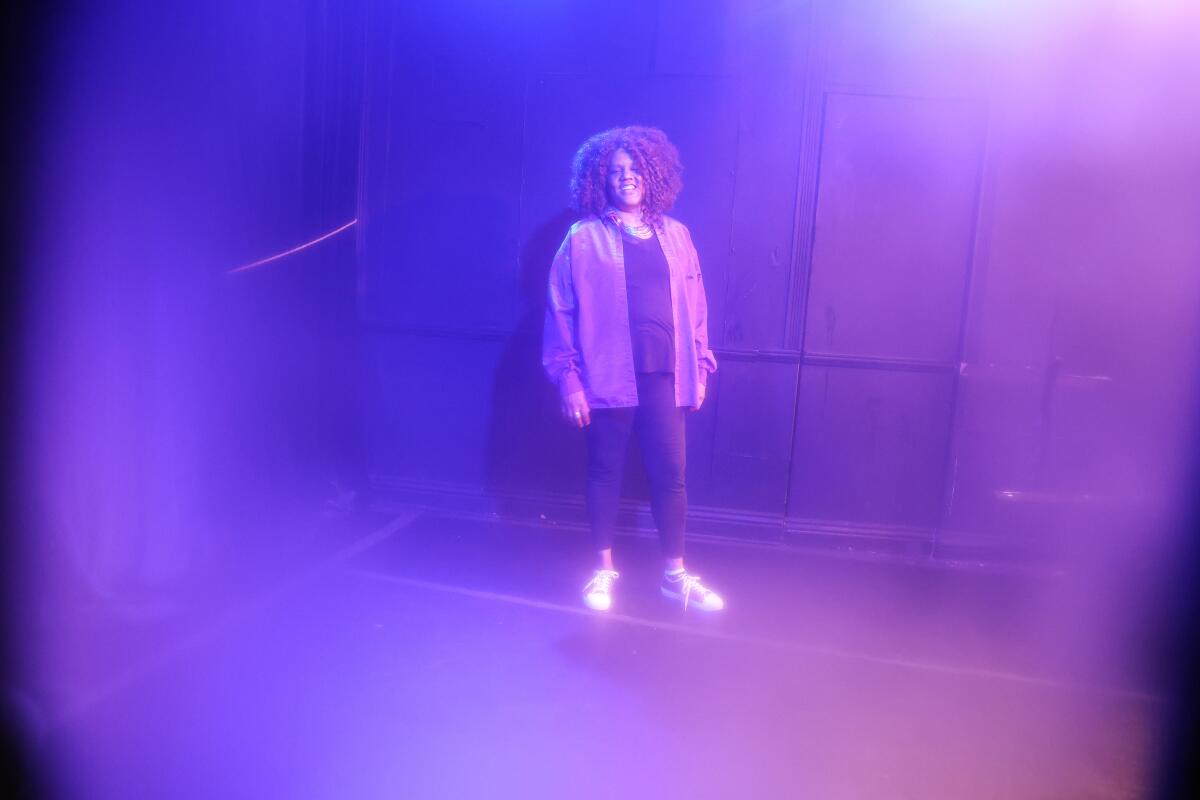
“I knew somehow in the weirdness of the ’90s, they were not going to give a 30-year-old Black woman a theater. This was the time. I’m old enough. My reputation is good enough. [She points to a wine refrigerator.] I’m a classy wino.”
From that determination, the Ledge Theater was born. Landry and the members of the Ledge perform and teach improvisational acting and exercises in school, theater or corporate surroundings. Established in spring 2021, the name came out of a conversation Landry had with Kim Howard Johnson, author of “Truth in Comedy: The Manual for Improvisation.” The Monty Python aficionado and actor wanted to support Landry but hadn’t improvised in a while. Landry said that she would “take him to the ledge” to help him hone his rusty improv skills. The encouragement, and the name, stuck.
But in L.A., has it really caught on? Places like Chicago revere improv as an art form, but L.A., with all its distractions and other entertainment vying for attention, may not have properly embraced it. Improv is more than just comedy. It’s obviously not scripted, but there are many structures and templates to perform under. It’s not stand-up comedy, but there are ample opportunities to riff. It’s communication, and though it may be classified as theater due to its staged presence, it has offstage and real-world applications.
Cheer up at one of these spots for stand-up comedy in L.A.
“Most of the people when I started in Second City were people who were lawyers who wanted to speak better in front of their clients and in front of a jury. It was doctors who wanted to communicate better,” said Landry. “I’ve done drama therapy before in prisons. What it does is it grounds a disadvantaged community. Even if it’s a disadvantaged community of Caucasians, having theater can be that guideline to getting out of places.”
Landry and her husband, Hans Summers, an improv performance couple who have been married since 1991, help form the board of directors for the Ledge, along with individuals whose skills keep things running. Summers and Jeffrey Thompson tackle the financials, Stephen C. James is educational director, Marshall Givens and Royce Shockley handle programming and Becky Brett oversees fundraising.
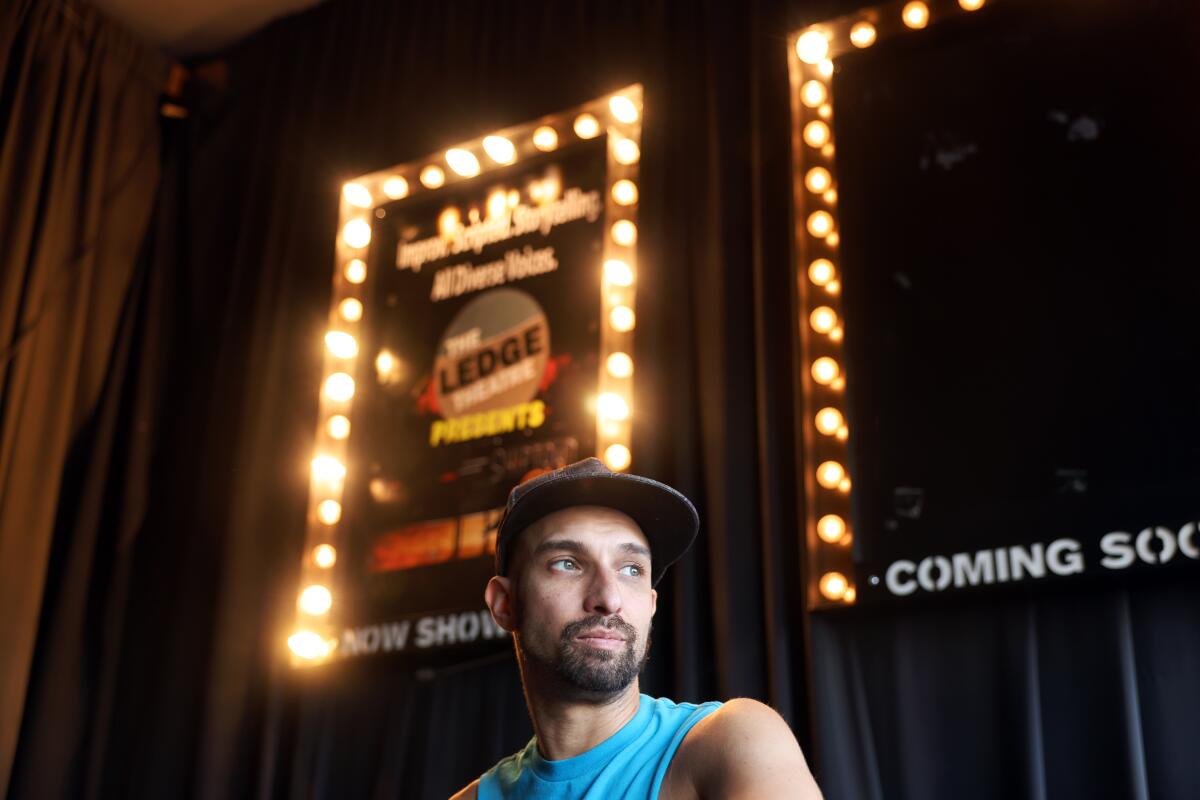
Programming and fundraising during a pandemic are challenging. The group found a temporary home at Lyric Hyperion Theatre, but as shows have ramped up — including the venue’s recent musical “The Streaming-Verse of Madness: An Unauthorized Musical Parody” with Aidan Park — the Ledge had to rethink that arrangement. The group recently moved to Skiptown Playhouse, but its goal is to have its own theatrical and educational space.
Despite business problems like an unstable theatrical base, an uncooperative California Arts Council (the group is too new for funding), a roller coaster of a pandemic (a COVID spike pushed the Ledge’s opening online) and constantly trying to make sure artists get paid, the board members are continuing to focus on what brought them all together.
“Not many comedy theaters are nonprofit because there’s a stigma around comedy being worthwhile,” said Brett, who lives in Hawaii and is constantly on the lookout for donations to the Ledge. She has seen how improv can help people and understands that “representation matters.”
“When kids can see their life acted out onstage, and see that it can turn out OK, that can change their entire trajectory,” Brett said.
While the board handles the business of the Ledge, the members of the group perform and teach theater to children, teens and adults. They have a full arts curriculum created for schools — improvisational theater that goes beyond just comedy and drama — and being geared toward the POC and LGBTQIA+ communities is just one step on a larger corrective path.
“We’ve basically — all of us that are on the board and are performers — all had the experience of being the one Black performer in a group of white improvisers or performers and feeling that onus of wondering why there weren’t more people like us on the stage or in the seats,” James said.
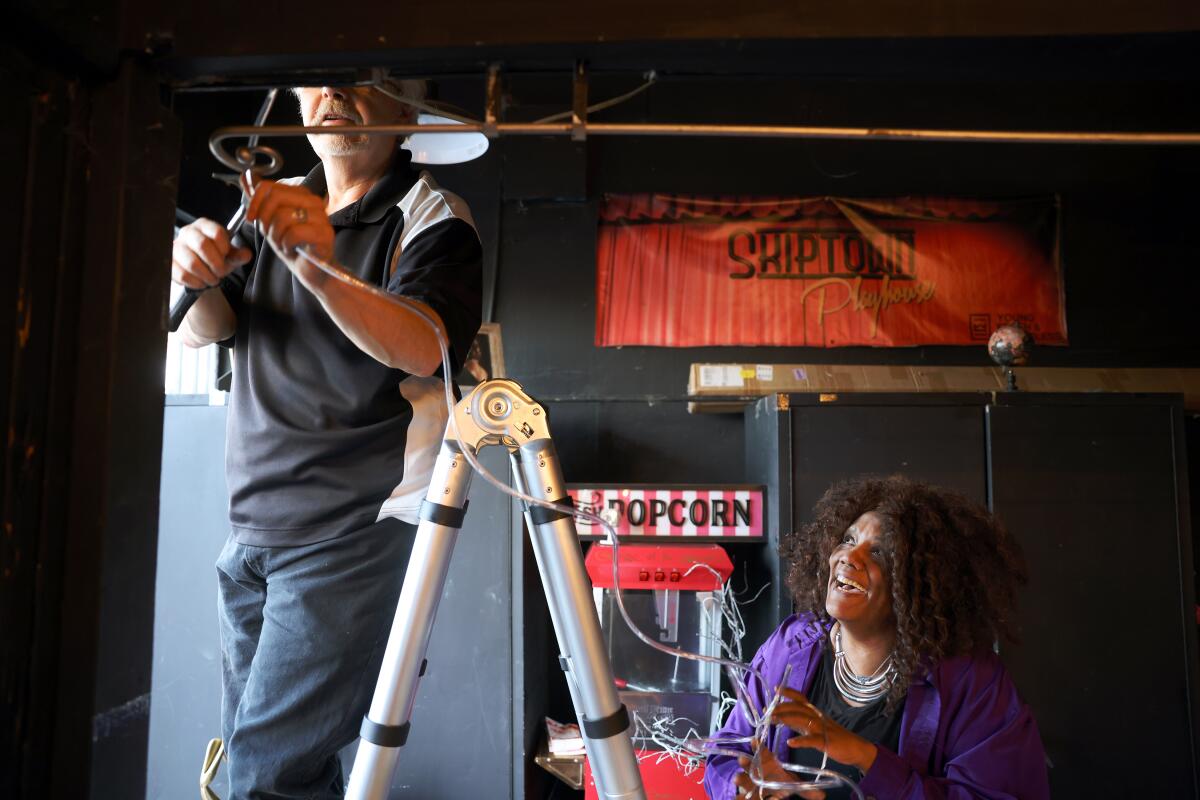
“When Shaun put that post out there on Facebook, I said to myself, ‘She figured it out.’ That’s what we do. We open a theater that is ours, and we invite everybody in and normalize the idea that the leadership is a Black woman. That the faculty are of all different races and genders and backgrounds, and we basically make it where it’s not just — no offense to [them] — a bunch of white guys in hoodies and New Balance shoes. We spread the word by opening up the world.”
Shockley also quickly saw the significance of Landry’s idea and offered to help.
“Because I am also the director of [the Pack Theater], what I learn in one place, I take that knowledge and just think, ‘Where can I help somewhere else?’ Whether that be, ‘Hey, I’ve got this contact,’ or ‘Hey, here’s an idea for how to do this business thing,’” Shockley said.
“I loved the first show because it was a little bit of everything. That’s essentially what we want the theater to be. Comedy is for everyone; it shouldn’t be done by just one group of people.”
“That’s essentially what we want the theater to be. Comedy is for everyone. Because it is for everyone; it shouldn’t be done by just one group of people.”
— The Ledge board member Royce Shockley
That spirit of paying it forward is also at the root of the Ledge’s educational philosophy.
“For the kids that come through, the object of taking a class at the Ledge is — yes, we’ll put you onstage — but the object is to leave so that you can create your own theater and you can create your own voice and you can become your own leader. Take it and carry it on and pass it to someone else,” Landry said.
It is still early days for the Ledge. Its most impactful show to date featured Marsha Warfield (of “Night Court” fame). It was a packed house, and Warfield told Landry that she plans to return. Landry bonded with Warfield over their shared upbringing: They, as well as Bernie Mac, Barack and Michelle Obama and Chaka Khan, all come from the same general Chicago neighborhood and share big talent and big personalities.
Landry may not want to hear it but the success of the theater group may hinge on her. As founder, she has the drive, knowledge, contacts and charisma that could power its growth. She opens her home to any creative who needs it and is just as generous with her gift for teaching and performing.
“If you’ve ever been onstage with her, she makes it feel like home,” James said. “And then, when you’re backstage with her, she makes it feel like home. Basically, she carries home with her wherever she goes.”
“Contrary to popular belief, I hate performing at the Ledge. I love performing there, but I hate it because this is not ‘The Shaun Landry Show,’” Landry said. “This is not about me, it’s about all of us, so I prefer not to have me or Hans perform. I prefer to teach.
“I want this to be all-inclusive, with different voices and different viewpoints.”
More to Read
The biggest entertainment stories
Get our big stories about Hollywood, film, television, music, arts, culture and more right in your inbox as soon as they publish.
You may occasionally receive promotional content from the Los Angeles Times.
